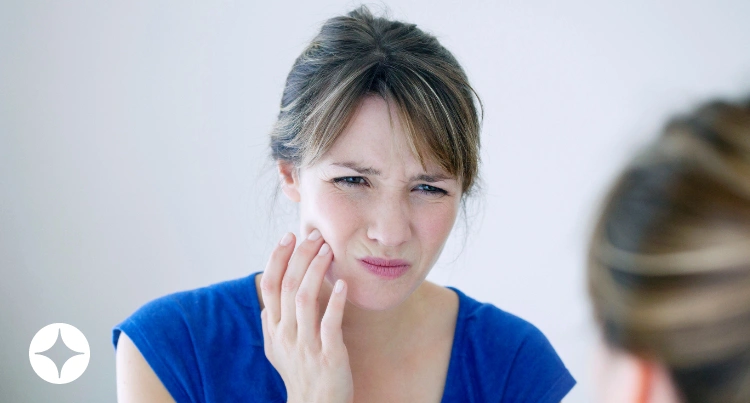
Research suggests that approximately 13% of adults[1] involuntarily grind or clench their teeth. This is called bruxism, and it can happen any time[2], day or night. Most people aren't aware of their actions, particularly when they're sleeping. This article covers bruxism, along with causes, effects and treatments.
Common Signs and Symptoms of Bruxism
Individuals may have just a few signs and symptoms[3] or a wide range. Things to look out for include:
- Chipped or cracked teeth
- Tooth sensitivity or pain
- Worn tooth enamel
- Headaches
- Earaches
- Jaw pain or locking
- Facial pain
- Sleep disruptions
- Cheek damage
- Indentations in the tongue
Effects of Bruxism on Sleep
Night bruxism[4] is a sleep-related movement disorder. People with bruxism typically sleep longer than those without nighttime teeth grinding, but they also experience more interruption[5] throughout the night and wake up earlier than expected. Another side effect was longer daytime naps and more nightmares[6].
Quality sleep is vital for good health[7], and grinding teeth can impact both physical and mental[8] health.
Causes of Involuntary Grinding of the Teeth
Although dentists, physicians and scientists aren't certain what causes bruxism[9], emotional factors, such as stress and anxiety, are often attributed to it. Additionally, medications, substance use, acid reflux or other sleep conditions can increase the risk[10] of sleep-related teeth grinding.
Links Between Nighttime Teeth Grinding and Other Sleep Conditions
Studies indicate that sleep bruxism occurs more frequently[11] for adults with sleep disorders[12], when compared with the general population. Around half of all people with certain sleep conditions also grind or clench their teeth while sleeping, with a direct correlation between the severity of the disorder[13] and the incidence of bruxism. The existence of such links may prove helpful for some people experiencing either sleep bruxism or other sleep disorders, as the presence of one might indicate a connection to the other.
Bruxism Treatment
For those dealing with sleep-related teeth grinding, effective treatments[14] include medications, therapy and mouth guards. Individuals who have an associated sleep disorder often find that receiving treatment for their condition helps resolve grinding their teeth while they sleep. For example, using sleep therapy equipment[15] to combat interruptions in sleep patterns might also reduce nighttime bruxism.
When using sleep equipment to treat a sleep disorder, individuals should always follow the user instructions and recommended cleaning routines for the best experience. Used alongside regular hand washing, SoClean 3[16] helps people maintain their equipment to the highest possible standards.
If you think you may have bruxism, speak to your dentist or doctor and have them give you their analysis. You may also wish to discuss the possibility of a coexisting sleep condition. After all, when you resolve your sleep issues, you're sure to find a significant improvement in your mood and your overall health.
References
- National Library of Medicine – Sleep bruxism: Current knowledge and contemporary management
- Johns Hopkins Medicine – Bruxism
- National Institute of Dental and Craniofacial Research – Bruxism
- American Academy of Sleep Medicine – The AASM International Classification of Sleep Disorders – Third Edition, Text Revision (ICSD-3-TR)
- National Library of Medicine – Association between Self-Reported Bruxism and Sleeping Patterns among Dental Students in Saudi Arabia: A Cross-Sectional Study
- WebMD – Nightmares in Adults
- SoClean – Why Do We Need Sleep?
- Columbia University Department of Psychiatry – How Sleep Deprivation Impacts Mental Health
- Mayo Clinic – Bruxism (teeth grinding)
- Cedars Sinai – Teeth Grinding: Causes, Treatments and Consequences
- ScienceDirect – Associations between sleep bruxism and other sleep-related disorders in adults: a systematic review
- MedlinePlus – Sleep Disorders
- National Library of Medicine – The Relationship between Sleep Bruxism and Obstructive Sleep Apnea Based on Polysomnographic Findings
- National Library of Medicine – Bruxism Management
- SoClean – Top Hacks for Improving Your Sleep Therapy Experience
- SoClean – SoClean 3




